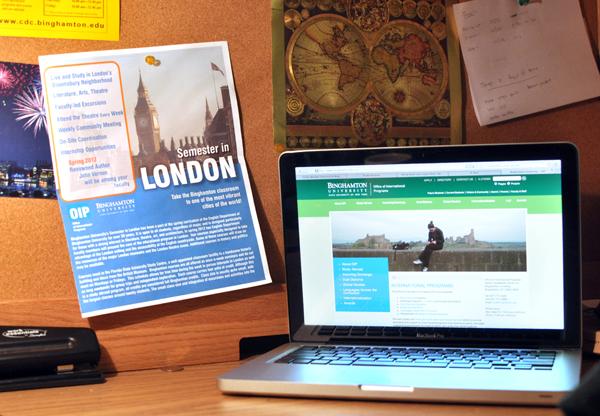
The opportunity to study abroad is one of the most sought-after college experiences. And why not? Going off to a foreign country for a semester, or a year, and getting academic credit for it seems like the perfect scenario. But is leaving Binghamton for months as glamorous as it seems? If you are thinking of studying abroad, consider the pros and cons before you make your decision.
Obviously, going overseas will expose you to a whole new world that you may never have known existed before. A new climate, food, culture, language and way of learning or style of relationship are certainly exciting and refreshing for anyone who has been living in one country for his or her entire life.
Exploring another culture or language is probably the most common reason to study abroad, and probably its greatest benefit. Lynn Mugodo, an undeclared freshman, thinks studying abroad could be a cultural resource that would ultimately develop her career.
“If I could study abroad, I would want to go to a French-speaking country so I could become completely fluent in French,” Mugodo said. “I want to work at the UN.”
The language spoken in a particular country could be as much of an obstacle as it is an attraction, though.
“I would have to go to a country where they spoke English because I can’t speak any other languages,” said Noah Schacker, a sophomore majoring in management. “So I would go to Australia or something.”
English-speaking countries can prove to have just as many advantages, from cultural and career-oriented standpoints, as non-English speaking countries. There are also programs in non-English speaking countries that have classes conducted in English.
If you are worried about obtaining credit for your time abroad, Binghamton University runs several programs — in English and in other languages — in which credit is easily transferrable from the program to your major. For example, the Binghamton University Semester in London program is comprised of Binghamton courses, taught by Binghamton faculty, and can easily apply to any major of any BU student, even though most courses are related to literature and theater.
For other programs, though, credit may be difficult to transfer and some credits earned through other study abroad programs may not even count toward a degree. Be sure to check with an adviser before registering for any classes abroad.
The issue of time is probably the biggest disadvantage for going abroad during your college career. If you have a major with an intensive curriculum, you may not have time to graduate in four years if you spend a semester away from campus.
Mugodo feels she will have to put her traveling aspirations on hold while she is in school because of her double major and minor. Asia Wecker, a senior majoring in accounting, finds a similar problem in studying in a foreign country.
“I’ve always wanted to go to London and study at the London School of Economics, or go to Italy for the culture, but that didn’t work out,” Wecker said. “I’m graduating in three years and so I won’t get that chance. I feel like I’ll be missing out, but I’m trading in the experience in order to advance my future career path.”
Some students, however, manage to find time to go on shorter trips, or they make the time to go on the longer trips of their dreams.
Emily Taubenblatt, a junior majoring in environmental studies, plans on extending her education in order to study abroad in Israel.
“I’m very involved on campus, and I want to be on an E-Board for my senior year,” Taubenblatt said. “If I went away next year, I would not get the opportunity to do that.”
Instead of sacrificing her positions in student groups, Taubenblatt wants to get the best of both worlds.
“Basically, I want to either graduate with my class then go abroad, or delay graduation and be a super senior studying abroad,” Taubenblatt said. “So instead of taking a gap year between high school and college, I’m taking a gap year between college and grad school.”
For those who are super-involved on campus and cannot afford to take a gap year, you may have to weigh your options. You may have to consider which is more important, your leadership experience or your international experience? For the record, both look incredible on a résumé.
Still, there are other options. Emily Duffel, a senior majoring in accounting, points out that there are alternatives to going away for a semester or a full year. There are many opportunities for week-long study abroad programs.
“There’s an India program for the international business class where you go to India and stay for 10 days,” Duffel said. “I’m going to Germany through the PWC Scholars program for a week in January.”
A program like this allows you to be on campus for your entire college career and cuts down the cost of studying abroad considerably. But you may not get the total immersion you’re looking for in a week-long experience. But while this is true, Duffel adds that it’s better than nothing.
“You still get the aspect of being in a foreign country,” Duffel said. “It’s good for people who have reservations about going abroad and being on their own.”
And speaking of cutting the cost, there is that pesky money thing that you will most likely have to pay attention to. Studying abroad isn’t cheap and a semester at another school in another country will likely cost way more than your Binghamton tuition. Scholarships and loans may help you out there though. And depending on the program, your BU financial aid may even be applicable. But it will definitely be a point to consider.
Whether or not it’s a good idea to study abroad is a decision that is truly dependent on the person making it. It all boils down to what is best for your individual interests and goals.


